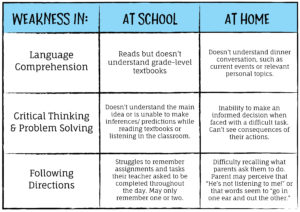Tips for Parents of Kids with a Comprehension Weakness: The Imagery-Language Connection at Home

When a student has an identified comprehension weakness, parents might pursue help for their academics. Unfortunately, language comprehension troubles can affect family life, too.
A primary cause of language comprehension problems is difficulty creating an imagined gestalt. This is called weak concept imagery. This weakness causes individuals to get only “parts” of information they read or hear, but not the whole.
Check out some examples of how concept imagery issues can affect school and home:
The Imagery-Language connection is key to good thinking and communication. You can help your child understand what he/she is hearing in the following ways:
1. In Conversation
During discussions with your child about their day or current events in the news, use imagery stimulating questions. For example, instead of asking, “What do you think about…?” you can ask, “What did you picture for that story in the news today?” or “What are you picturing for what might happen next?” You can expand upon these questions to dive into their images even more.
2. When There’s a Problem to Solve
Help your child monitor his or her understanding of their actions, as well as problem solving skills, by targeting specific images they’re creating while they’re processing oral or written language. Teach them to continually ask themselves whether they understand what the consequences may be of certain actions, and if they’re able to picture the outcome: “If I do this, what might happen? What does that look like?”
3. When You Give Instructions
Establish an imagery-language connection through daily life activities to stimulate learning. For example, when giving your child instructions, such as brushing their teeth, getting dressed, making their bed, ask your child to picture these tasks in their mind before they do them.
If you need further information or have questions regarding your child’s language comprehension weakness, we have answers. Please contact us at 800.300.1818 to find out more.







